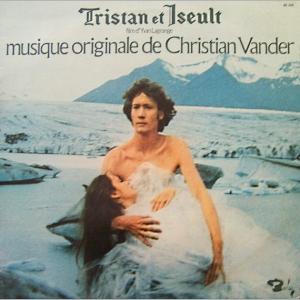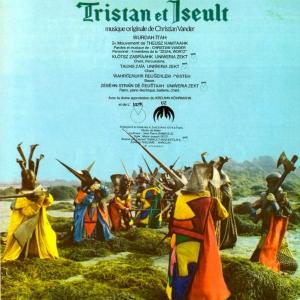Tristan Et Yseult
by Magma


Artist:
Christian Vander
Label:
Barclay
Catalog#:
80.528
Format:
Vinyl
Country:
France
Released:
1974
| Tracklist | |||
| A1 | Mala Welekaahm (Incantation) | 3:37 | |
| A2 | Bradia Da Zimehn Iegah (L'Initié A Parlé) | 2:17 | |
| A3 | Maneh Fur Da Zess (Ensemble Pour Le Maître) | 1:37 | |
| A4 | Fur Di Hel Kobaia (Pour La Vie Éternelle) | 4:55 | |
| A5 | Blüm Tendiwa (L'Âme Du Peuple) | 3:25 | |
| A6 | Wohldünt M^ë M Deweless (Message Dans L'Étendue) | 3:31 | |
| B1 | Wainsaht ! ! ! (En Avant) | 2:29 | |
| B2 | Wlasik Steuhn Kobaia (Ascension Vers L'Éternel) | 2:47 | |
| B3 | Sehnnteht Dros Wurdah Süms (La Mort N'est Rien | 3:25 | |
| B4 | C'est La Vie Qui Les A Menés Là ! | 2:03 | |
| B5 | Ek Sun Da Zess ? (Qui Est Le Maître ?) | 2:57 | |
| B6 | De « Zeuhl » Undazir (Vision De La Musique Céleste) | 5:57 | |
Credits
Wahrgenuhr Reugehlem Esteh - Bass
Jean-Pierre Bameulle - Engineer
Christian Vander - Music By, Words By
Zébehn Straïn Dë Geustaah - Piano, Electric Piano, Drums, Vocals
Laurent Thibault - Producer [Réalisation]
Tauhd Zaïa - Vocals
Klötsz Zaspïaahk - Vocals, Percussion
Notes
Enregistré et mixé les 4, 5, et 8 avril 1974 à Paris, Studio de Milan
Strawberry Bricks Entry:
Christian Vander's previous effort (MDK) was the third installment of his Theusz Hamtaahk ("Time of Hatred") trilogy: the account of the struggle between the planets Kobaïa and Earth. "Wurdah Ïtah," released as the soundtrack for Yvan Lagrange's film of the Tristan et Iseult tragedy, was the second part. Recorded in April 1974, it was presented as a Vander solo album, with the drummer also providing the main vocal and piano. Jannick Top, of course, was on hand with his sturdy bass, while Stella Vander and Klaus Blasquiz also contributed vocals. "Malawëlëkaahm" ("Incantation") opens the piece, alternating between a pulsing groove and something far more melodic. But what's most revealing is the crispness and clarity of the recording. Reduced to piano, voice and the aforementioned rhythm of Vander and Top, the album showcases the essence of the Magma sound, which at this time was Vander's rhythmic drumming and Top's bass tone. Describing the latter's tone, Julian Cope said, "He didn't have amplifiers; he just plugged straight into the National Grid." "Fur Dïhhël Kobaïa" approaches the majesty of the "celestial" and the grandeur of Carl Orff's cantata, while "Blüm Tendiwa" just plain swings. The second side continues the journey, and it's a flowing work of unwavering splendor. "Ëk Sün Da Zëss" undulates over Top's massive bass, which takes an even deeper rumble on the finale, "De Zeuhl Ündazïr." The album was released on Barclay Records and later reissued on the Egg label in 1978; it was later retitled Wurdah Ïtah. The first section of the trilogy, Theusz Hamtaahk, would see the light of day in 1980 on Retrospektiw I-II, though versions were recorded for Radio Bremen and the BBC's Top Gear in Early 1974.

